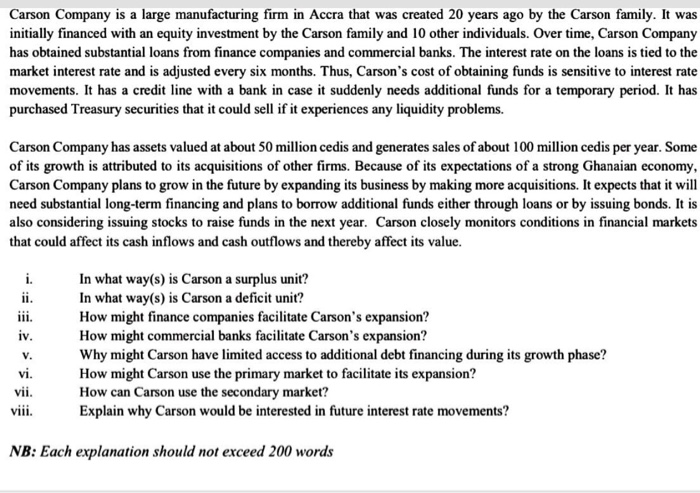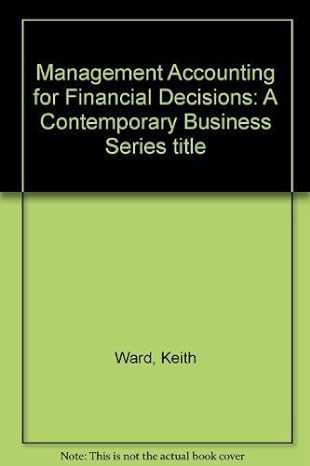Carson Company is a large manufacturing firm in Accra that was created 20 years ago by the Carson family. It was initially financed with an equity investment by the Carson family and 10 other individuals. Over time, Carson Company has obtained substantial loans from finance companies and commercial banks. The interest rate on the loans is tied to the market interest rate and is adjusted every six months. Thus, Carson's cost of obtaining funds is sensitive to interest rate movements. It has a credit line with a bank in case it suddenly needs additional funds for a temporary period. It has purchased Treasury securities that it could sell if it experiences any liquidity problems. Carson Company has assets valued at about 50 million cedis and generates sales of about 100 million cedis per year. Some of its growth is attributed to its acquisitions of other firms. Because of its expectations of a strong Ghanaian economy, Carson Company plans to grow in the future by expanding its business by making more acquisitions. It expects that it will need substantial long-term financing and plans to borrow additional funds either through loans or by issuing bonds. It is also considering issuing stocks to raise funds in the next year. Carson closely monitors conditions in financial markets that could affect its cash inflows and cash outflows and thereby affect its value. i. ii. iii. iv. In what way(s) is Carson a surplus unit? In what way(s) is Carson a deficit unit? How might finance companies facilitate Carson's expansion? How might commercial banks facilitate Carson's expansion? Why might Carson have limited access to additional debt financing during its growth phase? How might Carson use the primary market to facilitate its expansion? How can Carson use the secondary market? Explain why Carson would be interested in future interest rate movements? V. vi. vii. viii. NB: Each explanation should not exceed 200 words Carson Company is a large manufacturing firm in Accra that was created 20 years ago by the Carson family. It was initially financed with an equity investment by the Carson family and 10 other individuals. Over time, Carson Company has obtained substantial loans from finance companies and commercial banks. The interest rate on the loans is tied to the market interest rate and is adjusted every six months. Thus, Carson's cost of obtaining funds is sensitive to interest rate movements. It has a credit line with a bank in case it suddenly needs additional funds for a temporary period. It has purchased Treasury securities that it could sell if it experiences any liquidity problems. Carson Company has assets valued at about 50 million cedis and generates sales of about 100 million cedis per year. Some of its growth is attributed to its acquisitions of other firms. Because of its expectations of a strong Ghanaian economy, Carson Company plans to grow in the future by expanding its business by making more acquisitions. It expects that it will need substantial long-term financing and plans to borrow additional funds either through loans or by issuing bonds. It is also considering issuing stocks to raise funds in the next year. Carson closely monitors conditions in financial markets that could affect its cash inflows and cash outflows and thereby affect its value. i. ii. iii. iv. In what way(s) is Carson a surplus unit? In what way(s) is Carson a deficit unit? How might finance companies facilitate Carson's expansion? How might commercial banks facilitate Carson's expansion? Why might Carson have limited access to additional debt financing during its growth phase? How might Carson use the primary market to facilitate its expansion? How can Carson use the secondary market? Explain why Carson would be interested in future interest rate movements? V. vi. vii. viii. NB: Each explanation should not exceed







